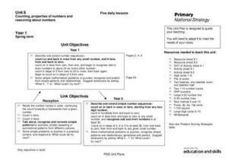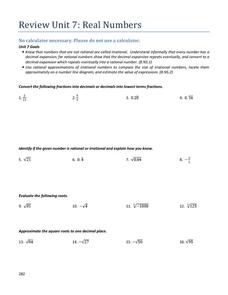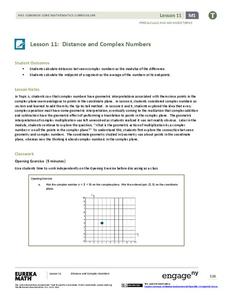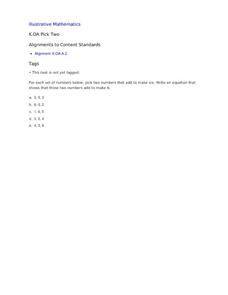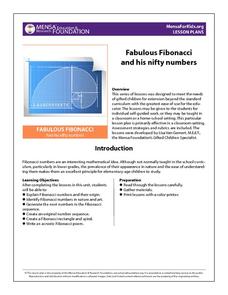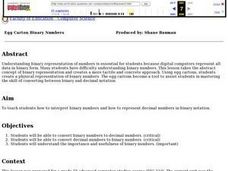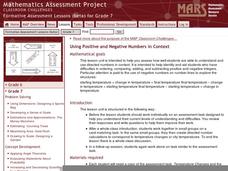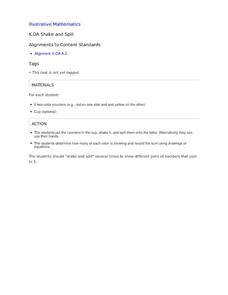Curated OER
Counting, Properties of Numbers, and Reasoning about Numbers
Five days of lessons develop number sense and counting patterns, including odd and even numbers, 5s and 10s, doubles, and ways to make 10. Each session opens with fun finger play to reinforce counting and reasoning about numbers. Various...
Charleston School District
Review Unit 7: Real Numbers
Provide pupils with problems to check their understanding of the concepts within the unit. The seven-part series of lessons covers concepts related to irrational numbers. Learners convert between fractions and decimals, estimate the...
EngageNY
Complex Numbers as Vectors
Show your math class how to use vectors in adding complex numbers. Vectors represent complex numbers as opposed to points in the coordinate plane. The class uses the geometric representation to add and subtract complex numbers and...
EngageNY
Distance and Complex Numbers 1
To work through the complexity of coordinate geometry pupils make the connection between the coordinate plane and the complex plane as they plot complex numbers in the 11th part of a series of 32. Making the connection between the two...
EngageNY
Comparing Integers and Other Rational Numbers
The ninth installment of a 21-part module has pupils compare integers and rational numbers in decimal and fraction form. They match stories to number lines and compare values in the stories.
Illustrative Mathematics
Pick Two
Learning to break apart numbers into smaller pairs is a critical step young mathematicians take as they develop their number sense. To practice this skill, children are provided with sets of three numbers and are asked to pick the two...
Core Knowledge Foundation
A “Whole” Lot of Fraction Fun!
Young mathematicians are introduced to fractions in a unit that helps them to understand parts of a whole.
Illustrative Mathematics
Converting Decimal Representations of Rational Numbers to Fraction Representations
A rational number is a ratio of two integers. Discuss with your class how to convert the rational numbers of repeating decimals to fractions. A good commentary on letting x equal the repeating decimal and multiplying each side of such...
MENSA Education & Research Foundation
Fabulous Fibonacci and His Nifty Numbers
Fibonacci numbers are not only found in the classroom but also in nature. Explore the concept of Fibonacci numbers through a series of lessons designed to gain insight into the mathematical reasoning behind the number pattern, and spark...
EngageNY
Distance and Complex Numbers 2
Classmates apply midpoint concepts by leapfrogging around the complex plane. The 12th lesson in a 32 segment unit, asks pupils to apply distances and midpoints in relationship to two complex numbers. The class develops a formula to find...
EngageNY
Rational Numbers on the Number Line
Individuals learn how to plot rational numbers on the number line in the sixth lesson of a 21-part module. They identify appropriate units and determine opposites of rational numbers.
Curated OER
Egg Carton Binary Numbers
Learners take the abstract concept of binary representation and create a more tactile and concrete approach. Using egg cartons, they create a physical representation of binary numbers. The egg cartons become a tool to assist young...
Grammar Net
Numbers 1-30
Jot down some figures with an activity about printing numbers. First, learners fill in the blanks with the numbers next to their printed forms. Then, they complete simple addition and subtraction problems with numbers that are written out.
Curated OER
Rounding to the Nearest Whole Number
Bring money and measurement together by practicing rounding decimals to the nearest whole number. Three sections prompt fourth graders to round to the nearest dollar, the nearest meter, and the nearest whole unit. Use this activity as an...
Illustrative Mathematics
Identifying Rational Numbers
Eight different numbers are listed for mathematics masters to analyze. They simply tell if each number is rational or irrational. They can also explain their reasoning. A simple and straightforward worksheet that is a handy tool for...
Mathematics Assessment Project
Using Positive and Negative Numbers in Context
Measure the temperature of your math class with a temperature-based lesson on adding and subtracting rational numbers. The thermometer serves as a vertical number line for learners as they work together to solve a temperature change...
Illustrative Mathematics
Calculating and Rounding Numbers
Mathematicians need to know that not all numbers are rational. We approximate irrational number with rational numbers. That is why a calculator may be misleading. This task give learners an opportunity to see how rounding a number and...
Illustrative Mathematics
What’s Missing?
Now you see them, now you don't! This fun peek-a-boo activity engages young mathematicians in developing their ability to compose and decompose numbers. After being presented with a series of counters, children close their eyes while the...
Illustrative Mathematics
Shake and Spill
Entertaining as well as educational, this math activity about decomposing numbers is bound to capture the engagement of young learners. Given a cup and five two-color counters, young mathematicians simply shake and spill the cup,...
Thomson Brooks-Core
Complex Numbers
A straightforward approach to teaching complex numbers, this lesson addresses the concepts of complex numbers, polar coordinates, Euler's formula, De moivres Theorem, and more. It includes a practice problems set with odd answers and a...
Charleston School District
Pre-Test Unit 7: Real Numbers
Don't be irrational! Use this pre-test to assess your classes' ability to work with all types of real numbers. The lesson asks learners to estimate value, evaluate roots, and order numbers. This begins a series of lessons on the real...
EngageNY
Trigonometry and Complex Numbers
Complex numbers were first represented on the complex plane, now they are being represented using sine and cosine. Introduce the class to the polar form of a complex number with the 13th part of a 32-part series that defines the argument...
EngageNY
Dividing Fractions and Mixed Numbers
Class members discover how to extend division to fractions to mixed numbers. Individuals first review how to convert mixed numbers to improper fractions and then apply division strategies learned in previous lessons. A memory game tests...
EngageNY
Ordering Integers and Other Rational Numbers
Scholars learn to order rational numbers in the seventh lesson in a series of 21. Reasoning about numbers on a number line allows for this ordering.
Other popular searches
- Early Numeracy
- Adult Numeracy Network
- Numeracy Year 3
- Foundation Stage Numeracy
- Adult Numeracy
- Year One Numeracy
- Numeracy Data Handling
- Numeracy Year 5
- Basic Numeracy
- Numeracy Games
- Numeracy Time
- Literacy and Numeracy


